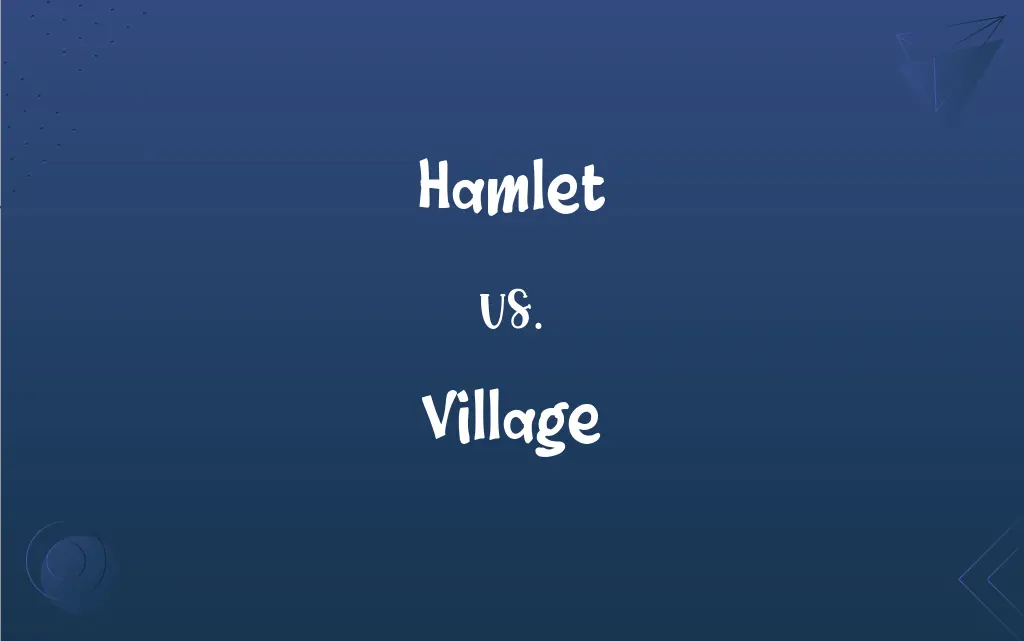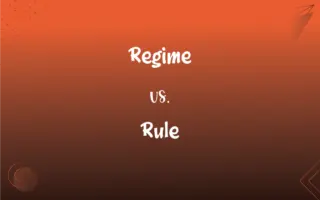Hamlet vs. Village: What's the Difference?
Edited by Harlon Moss || By Janet White || Published on December 2, 2023
A hamlet is a small, rural settlement with few inhabitants and no church, while a village is larger, often with a church and local governance.

Key Differences
A hamlet is typically smaller than a village, with fewer houses and a smaller population. In contrast, a village is a larger settlement, usually with more facilities and a higher population than a hamlet.
Hamlets often lack major amenities like churches, post offices, or shops. Villages, however, usually have key amenities such as a church, a primary school, and small local businesses.
Hamlets generally do not have a formal administrative structure or local government. Villages often have some form of local governance, like a village council.
Both hamlets and villages have historical significance, but villages are more likely to be centers of cultural and social activities due to their larger size and facilities.
Both are rural settlements, but hamlets are typically more isolated and quieter than villages, which are relatively more bustling with community life and activities.
ADVERTISEMENT
Comparison Chart
Population
Smaller population, often just a few homes.
Larger population with more homes.
Amenities
Few to no amenities like shops or churches.
Usually has a church, shop, and school.
Governance
Lacks formal local government.
Often has a form of local governance.
Social and Cultural Hub
Rarely a social or cultural center.
Often a center for community activities.
Geographical Spread
Tends to be more isolated.
More central with better connectivity.
ADVERTISEMENT
Hamlet and Village Definitions
Hamlet
A rural locality smaller than a village.
The hamlet they lived in was so small it didn’t even have a grocery store.
Village
A residential area smaller than a town.
They lived in a peaceful village surrounded by farmland.
Hamlet
A settlement too small to be considered a village.
In that remote hamlet, everyone knew each other's names.
Village
A settlement typically larger than a hamlet.
The village had its own school and a small grocery store.
Hamlet
A very small rural settlement.
The tiny hamlet was nestled in the mountains, far from the nearest town.
Village
A small community or group of houses in a rural area.
The village festival brought everyone together each summer.
Hamlet
A minor settlement, often without its own church.
The old mill stood alone, the last remaining structure in the abandoned hamlet.
Village
A small populated area with local governance.
The village council met monthly to discuss community issues.
Hamlet
A small cluster of houses in a rural area.
She visited her grandmother's hamlet, where only a few families lived.
Village
A rural locality with basic amenities.
Their village was quaint, with a church, a post office, and a café.
Hamlet
A small village.
Village
A small group of dwellings in a rural area, usually ranking in size between a hamlet and a town.
Hamlet
In New York state, an unincorporated community that is within a town and is not a part of a village.
Village
In some US states, an incorporated community smaller in population than a town.
Hamlet
A small village or a group of houses.
Hamlet
(British) A village that does not have its own church.
Hamlet
Any of the fish of the genus Hypoplectrus in the family Serranidae.
Hamlet
A small village; a little cluster of houses in the country.
The country wasted, and the hamlets burned.
Hamlet
A community of people smaller than a village
Hamlet
The hero of William Shakespeare's tragedy who hoped to avenge the murder of his father
Hamlet
A settlement smaller than a town
FAQs
What defines a hamlet?
A small, rural settlement with few facilities.
Are hamlets always part of larger towns?
Not always; they can be independent or part of larger rural areas.
How is a village different from a hamlet?
A village is larger than a hamlet and typically has more amenities.
Do hamlets have churches?
Usually, hamlets do not have churches.
Can a village be part of a town?
Yes, some villages are part of or adjacent to larger towns.
Is a hamlet considered a legal entity?
This depends on the country, but generally, hamlets have no legal status.
Is a hamlet always rural?
Yes, hamlets are by definition rural.
Are there shops in hamlets?
Hamlets typically have few or no shops.
Can a village have a mayor or similar official?
In some regions, villages have mayors or village heads.
Can a village have local governance?
Yes, villages often have some form of local governance.
Do villages often have historical significance?
Yes, many villages have rich histories and cultural significance.
Do hamlets have postal services?
Often, they do not; residents may need to travel to nearby towns or villages for postal services.
Can a village become a town?
Yes, as it grows in population and infrastructure, a village can become a town.
Do hamlets have public transportation?
Generally, public transport is limited or nonexistent in hamlets.
Do hamlets have their own identity?
Yes, despite their small size, hamlets often have distinct identities.
Do villages usually have schools?
Many villages have at least a primary school.
Is there a population limit for a hamlet?
There's no strict limit, but hamlets are characterized by very small populations.
Can a village have a diverse population?
Villages can be diverse, especially those in regions with varied demographics.
Are villages prone to urbanization?
Villages can be subject to urbanization, especially those near cities.
Are villages more self-sufficient than hamlets?
Typically, yes, due to more amenities and resources.
About Author
Written by
Janet WhiteJanet White has been an esteemed writer and blogger for Difference Wiki. Holding a Master's degree in Science and Medical Journalism from the prestigious Boston University, she has consistently demonstrated her expertise and passion for her field. When she's not immersed in her work, Janet relishes her time exercising, delving into a good book, and cherishing moments with friends and family.
Edited by
Harlon MossHarlon is a seasoned quality moderator and accomplished content writer for Difference Wiki. An alumnus of the prestigious University of California, he earned his degree in Computer Science. Leveraging his academic background, Harlon brings a meticulous and informed perspective to his work, ensuring content accuracy and excellence.






































































